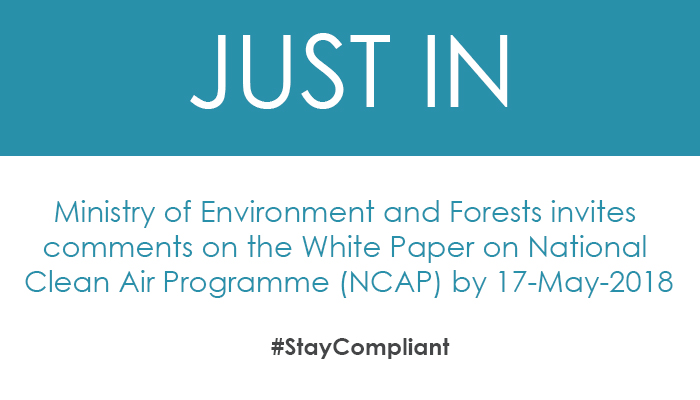The Ministry of Environment and Forests (“MoeF”) has invited comments and suggestions from the general public on the National Clean Air Programme (NCAP). The comments and suggestions may be sent to Dr. Shruti Raj Bhardwaj by way of an e-mail at shruti.rai@nic.in within May 17, 2018.
The NCAP has been introduced with the objective of meeting the prescribed annual average ambient air quality standards at all locations in the country within a stipulated timeframe. Its main objectives are:
- To promote an effective and proficient ambient air quality monitoring network across the country for ensuring comprehensive and reliable database
- To have an efficient data dissemination and public outreach mechanism for timely measures for prevention and mitigation of air pollution and for inclusive public participation in both planning and implementation of the programmes and policies of government on air pollution
- To have feasible management plan for prevention, control and abatement of air pollution.
The NCAP also details out the various initiatives undertaken by the Government towards achieving the ultimate goal of establishing ambient air quality standards throughout the country:
- The creation of the National Air Quality Monitoring Programme for monitoring the status and trend of ambient air quality along with meteorological parameters such as wind speed, direction, relative humidity etc.
- The initiation of the National Air Quality Index with communication of the current ambient air quality to the masses.
- The institution of the Environment Pollution (Prevention and Control) Authority for prevention and controlling the air pollution in Delhi NCR.
- The institution of vehicular norms and practices such creation of the Bharat Stage IV norms, shifting from Petrol and Diesel to CNG/LPG etc.
The NCAP further details the steps the Government intends to take in the future with things like having Manual Ambient Air Monitoring Stations, having a Rural Monitoring Network, monitoring and managing indoor air pollution, conducting Air Pollution health impact studies, setting up an Air Information Centre etc.
Source: Ministry of Environment and Forests





